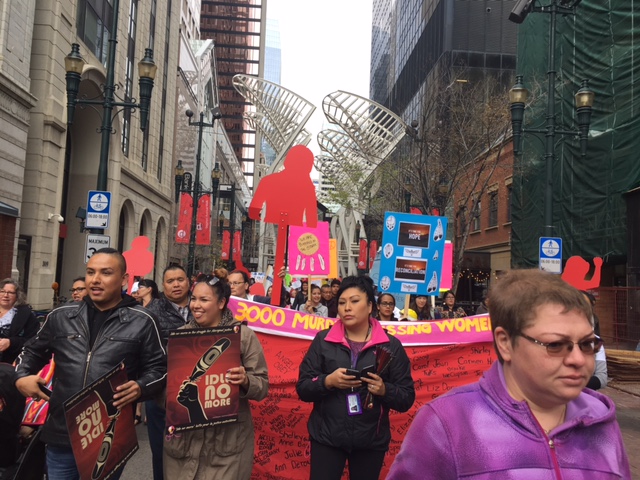 Blog post by our Policy Analyst, Mansharn Toor, originally published on The Tempest. September will mark the beginning of a two-year inquiry into murdered and missing Indigenous women and girls (MMIW) in Canada. As promised in the 2015 elections, the Liberal government invested $53.8 million over two-years for the MMIW inquiry. The long awaited inquiry will investigate the estimated 1,181 murdered and missing Indigenous women and girls, an ever growing number. The Liberal government promised the process will be inclusive, transparent, and respectful of a nation-to-nation relationship with Indigenous peoples. While I commend the Liberal Party’s commitment to fill the roster with Indigenous activists and intellectuals like Judge Marion Buller, a First Nations Judge from BC; and includes former Native Women’s Association of Canada president, Michèle Audette, lawyer Qajaq Robinson, University of Saskatechwan professor, Metis Marilyn Poitras, and Human Rights expert, Brian Eyolfson, I will hold my breath before announcing complete success. Of the mandates the commissioners are responsible for (1) reporting on systemic causes of violence against Indigenous women and girls; (2) reporting on institutional policies and practices in response to violence experience by Indigenous women and girls; (3) recommending action to remove systemic causes of violence; and (4) recommend ways to honour and commemorate the missing and murdered Indigenous women and girls in Canada. However, the commission cannot critically assess the role of policing and police policies that invite the racialization and sexualisation of Indigenous peoples. It is troubling that the document does not provide avenues to investigate officer misconduct. Instead, the document states that commissioners must perform their “duties without expressing any conclusion or recommendation regarding the civil or criminal liability of any person or organization.” Therefore, if the commissioner’s collect information that they believe are grounds for criminal investigation, they are only mandated to report such information to the “appropriate authorities.” As a Policy Analyst with the Canadian Cultural Mosaic Foundation, Canada’s law enforcement is not exempt from racial profiling, discrimination, and overt use of force. This is especially true for Indigenous peoples who have a rocky history with the RCMP in Canada, and in some regions Indigenous peoples have asked for support to fund and train their own officers. The Native Women’s Association of Canada (NWAC) expressed concerns following the announcement. The NWAC noted that for the families that want to open previously closed cases and seek justice, the commission has no legal authority to provide such closer to families. The association was also critical of the two-year timetable for culturally based counseling for the victims of MMIW. The issue of MMIW is closely linked to a history of trauma for Indigenous peoples in Canada, as noted in the Truth and Reconciliation Commission. The document expresses little jurisdictional clarity for the commission to access information to assess Child Welfare and Family Services across provincial and territorial boundaries. The jurisdictional issue of overstepping provincial and territorial borders can limit the investigation into Child Welfare. This is a system that contributes to the human trafficking of Indigenous women and girls, who in a number of cases were recruited from group homes and housing that was part of Child Welfare.The racialization and sexualisation of Indigenous women and girls will continue if the systems of violence and colonialism are not appropriately remedied. Today, I would argue, women and children are at the forefront of colonial violence that threatens Canada’s national image. For instance, Canada has just recently addressed the violent history of residential schools in the national Truth and Reconciliation Commission (TRC) where survivors shared their stories of physical and emotional abuse when the government placed many Indigenous children into the residential school system. This evidently continues to cause generations of trauma as noted in the TRC’s Calls to Action. Similarly, the sixties scoop, was a policy between 1965 to 1984 in Ontario, that scooped up 16,000 children from Indigenous parents (at times without their consent) into non-Indigenous homes or foster care. The survivors have launched a class action case wherein the survivors are seeking monetary relief, of $85 000, for the social, physiological, and physical impact of losing their cultures, languages, and connection to their families and communities. Indigenous peoples are continually confronting a violent past and present. The cycle of violence of colonization is also very noticeable upon Indigenous women, who have felt the brunt of colonial policies that have reduced the traditional roles of Indigenous women. Women have historically lost their right to Indigenous status if they married outside their race. Moreover, in pre-colonial era, some communities practiced matrilineal ownership, wherein communal property would follow the female line. This implied the unique political role women held in their community. However, after centuries of property rights where women were not allowed to own their land and with recent land claim agreements, Indigenous women no longer hold the once prestigious role. Indigenous women, having been so determined, continue to shape their communities despite the set back, and have been the voice behind Canada’s Idle No More movement and the calls for a national Indigenous led inquiry. Yet, Canada continues to reduce, devalue, and disavow women’s identity, and the commission on MMIW provides few avenues for reclamation due to the lack of legal mandate that falls short of actionable tasks and adds to the already rich rhetoric that Canada has a systemic racial issue, especially towards the first peoples of this land. It comes as no surprise to Indigenous activists like Pamela Palmater, a Mi’kmaw lawyer, that an inquiry that does not address law enforcement and child services, does not meet Trudeau’s election promises for an investigation that seeks “uncomfortable truths.”
0 Comments
|
Archives
January 2024
|
 RSS Feed
RSS Feed
